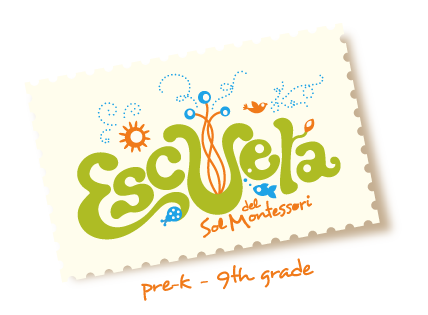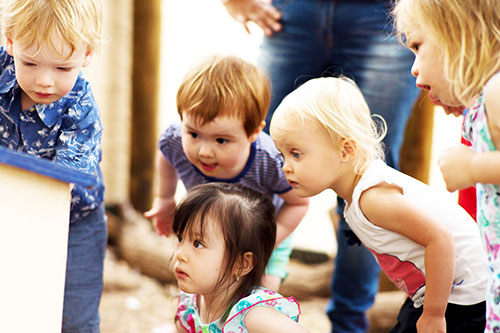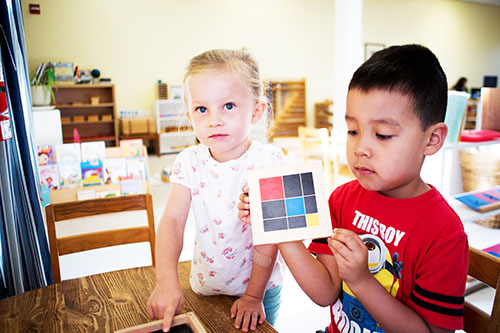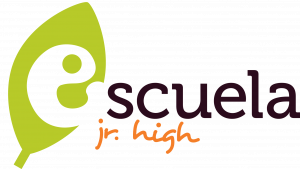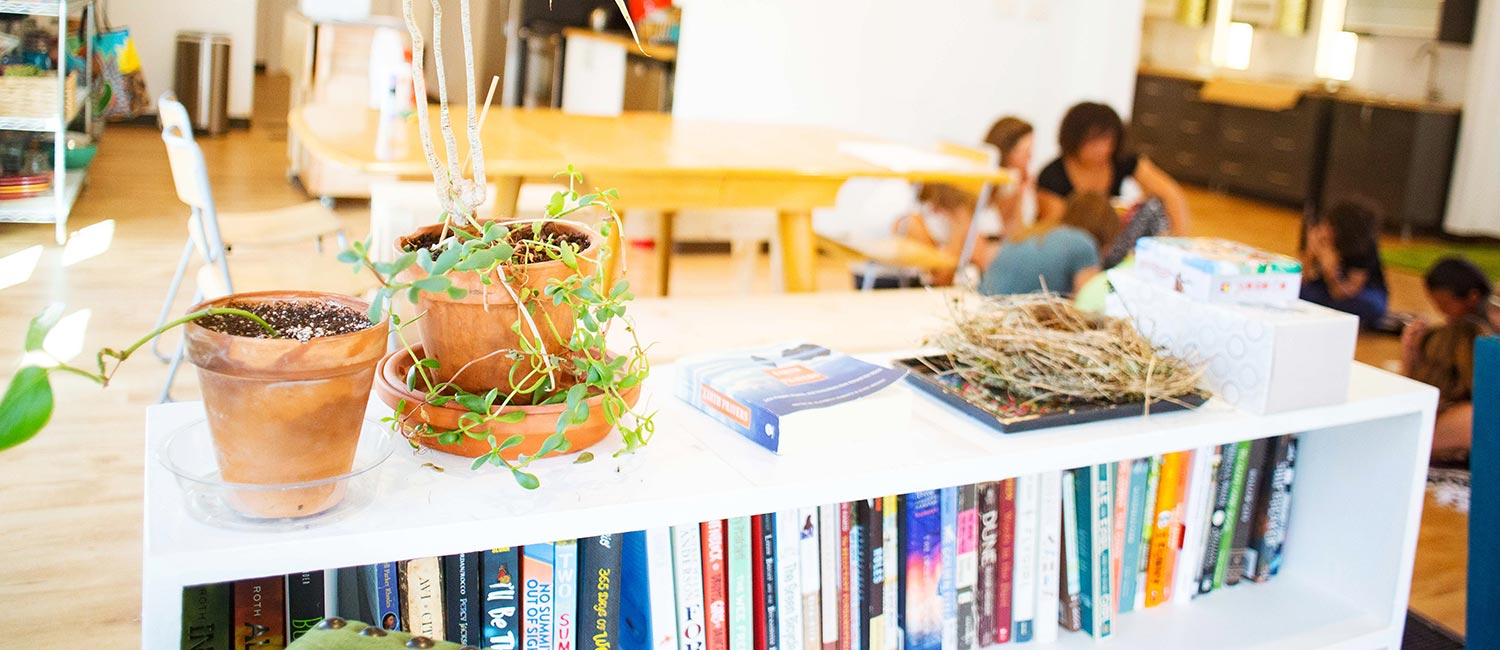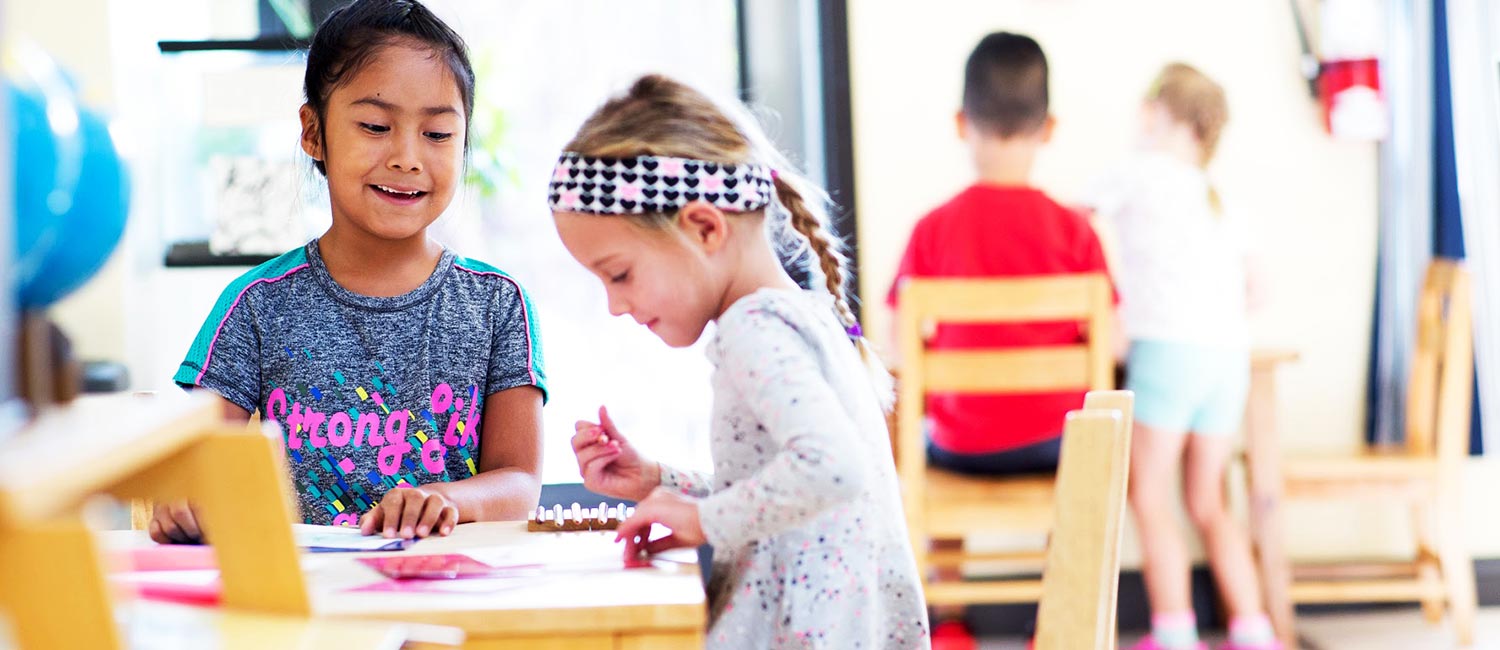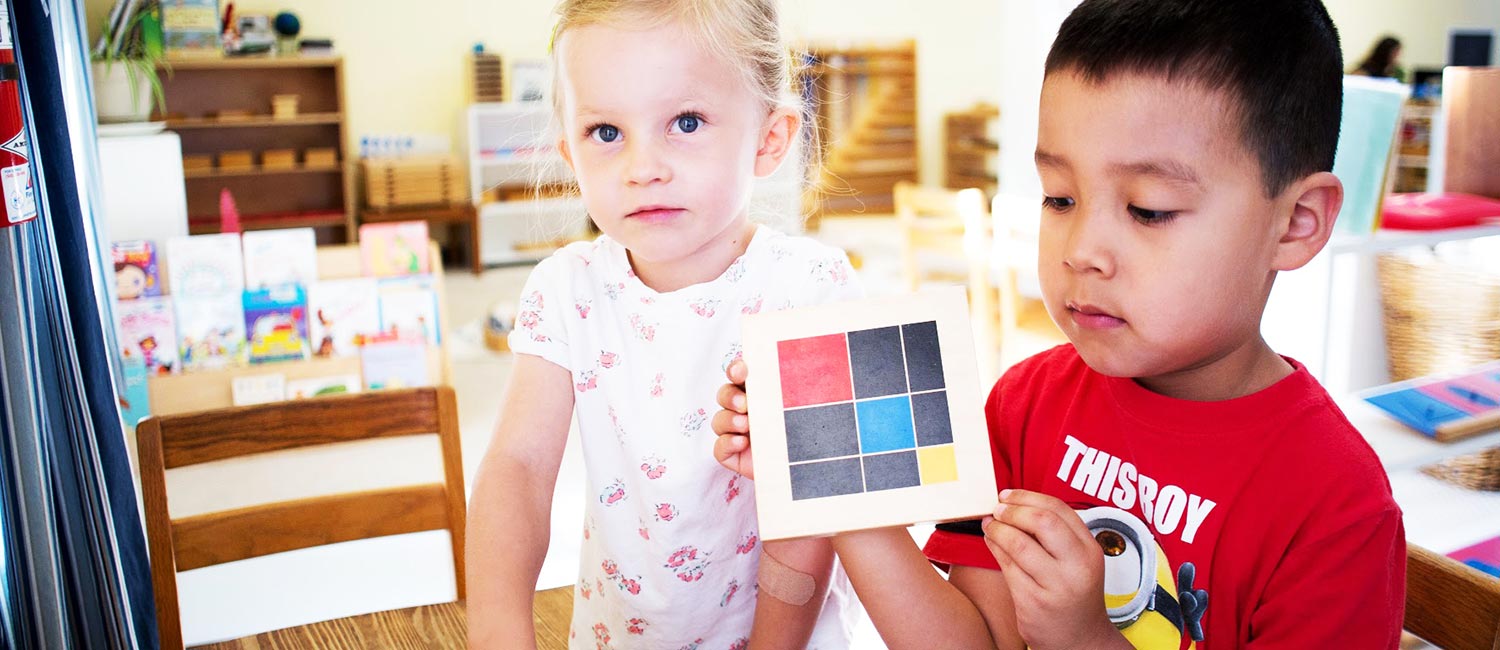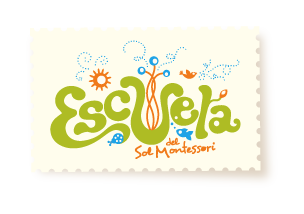Jr. High
grades 7 – 9
The curriculum for adolescents, beginning in 7th grade, ushers in a new stage of development. Students’ needs and potential are supported by increasingly sophisticated work, choices, and responsibilities. The two years students spend in Jr. High weave academic research and skills with experiences that connect these emerging adults to the real work of adulthood. Guided by a nuanced understanding of the gifts and challenges of adolescence, lessons are often given in the context of class projects. The Montessori Junior High School environment challenges and inspires students to acquire new information, master new skills, and make deep connections with people and ideas to promote critical thinking and problem-solving.
How does Junior High School differ from Middle School? The short answer is that the mixed-age groupings in a Montessori school are based on human development. Around age 12, people experience dramatic changes of body and brain: the beginning of adolescence. In Montessori schools, as well as in other systems – some conventional – 6th grade is the Capstone Year of Elementary.
What We Offer
- An experience of working and living in an adult-like manner
- A studio for academic, social, and identity experimentation and exploration
- A safe environment that supports all aspects of development within the context of the social world in which they currently live
- Smaller “family style” community. Students learn that they can’t “run away” from conflict, but instead learn to appreciate one another; to build a capacity for discourse and courageous conversations across differences
- Smaller adult to student ratio
- A multi-generational learning model
- Authentic Montessori philosophy that supports adolescent development
- Anti-biased, inclusive, anti-racist teaching and learning models
- Justice and equity through service-learning and community involvement
- Student-led and designed project-based learning
Student-run:
- business, [UN]Earthed, specializing in body products, produce and products from the Urban Farm, and handcrafted baked goods
- Urban Farm that has included chickens, beehives, raised beds, and in-ground plants and vegetables
- lunch program that feeds the Jr. High community each day
Academics
The academic components of the Escuela Jr. High are organized around Dr. Montessori’s Plan of Study and Work. All lessons are interdisciplinary with an emphasis on choice and opportunity, maximum effort, human invention and contribution, responsibility, and lifelong learning. We have five central components underlying our curriculum: Mathematics, Humanities, Applied Science (Occupations), Creative Expression / Physical Education, Connection to Nature, and Community Life.
Jr. High has a weekly *block schedule:
Monday: Morning Meeting, Math, Humanities/Science, Seminar/Book Group
Tuesday: Humanities/Science, Seminar/Book Group, Art
Wednesday: Conferences & Independent Study
Thursday: Spanish, Music, Study Hall/Presentations
Friday: Community Meeting, Read Aloud/Craft Time
*based on Home Learning Workshop schedule
Mathematics
- Includes direct instruction alongside daily practice
- Applied mathematics that includes algebra and geometry; instruction matches each student’s ability
- Assessment and Evaluation includes weekly check-ins, tracked progress, goal setting, and self- and teacher evaluation
- Multi-disciplinary approach that incorporates: math seminar; history & cross-curricular projects; skill-building; and direct application through farm work
- Deeper understanding is reached because lessons are multi-sensory; students are encouraged to use materials and to utilize one another as resources
- Work includes direct instruction, math history projects, applied mathematics, architecture projects, puzzles, games, and written and oral exams
Applied Science (Occupations)
- Includes engineering and design process, scientific method, geology, botany, zoology, chemistry, physics, sustainability and permaculture principles, and environmental studies
- Students engage through horticulture, chickens, bees, water studies, compost and construction projects
- Work includes art, science, mathematics, reflection, community engagement projects, collaborative research, experimentation, and economics
Humanities
- Includes an expansive study of human history, geography, connections between humans and their environments and other humans, law/government, literature and the arts
- Students engage through individually designed projects, group collaborations, seminar, lecture, and note-taking, as well through community engagement and/or off-campus visits and collaborations
- Work includes art, literature, human contributions to collective learning, essay writing, oral presentations, performance, vocabulary building, and research
- Examples of past units: Maya, Mesopotamia, Greece, African Empires, US Immigration, American Slavery, Feminism & Social Justice
Language Arts (intersects with all subject areas)
- Book Club
- Socratic Seminar
- Writer’s Workshop: Editing & Revision
- Poetry, Short Story Writing
- Media Literacy
- Essay Writing: narrative, expository & persuasive
- MLA Formatting
Additional Language
- Spanish is the language offered in Jr. High and is a required class for all students.
Health & Human Development
- Human Sexuality (Our Whole Lives curriculum)
- Human Growth & Development (puberty, adolescent brain development, planes of development)
- Mindfulness & Stress Reduction
- Executive Functions & Study Skills
- Healthy Communication
Creative Expression & Physical Education
- Includes a variety of fine and visual arts, performance, and literary arts, as well as physical activities that strengthen and challenge growing bodies. Past activities have included yoga, rock climbing, circus arts, charcoal drawing, food preservation, kickboxing, and embroidery.
- Students participate in weekly music classes that include researching and learning songs, songwriting, learning to play a variety of instruments, performances at Escuela events and around Albuquerque, collaboration, exploration, and connection.
Connection to Nature
- Fall Backpack Trek
- Winter Community Retreat
- Spring NM Trek / Spring out-of-state Odyssey (alternate every other year)
- Ongoing work on the Urban Farm and with local farmers in the community
Community Life
- Lunch Program: Students plan, shop and prepare daily meals
- Monthly Community Dinners, which include themed evenings of laughter, connection, study, and food
- [UN]Earthed sales events throughout the year
- Jr. High Band and/or musical performances
- X-Term (week-long, community-based learning experience)
- Spring Art Exhibition with Harwood Art Center
- Participation in ABQ community events and service-learning opportunities
*Because of Covid-19 movement and interaction have been limited, and fall treks were canceled. Escuela keeps the doors and windows to all classrooms open for ventilation. Students are using outdoor classroom spaces and well-ventilated indoor classroom spaces. Along with a stringent sanitizing protocol, proper mask use and social distancing we strive to insure the safety of our students. Details of our Covid safety procedures can be found here.
Expectations
The Importance of Choice in Junior High School
Dr. Montessori spoke extensively about the importance of choice for young people. This has been misconstrued as students doing whatever they want, which is certainly not the case. Rather, we expect students to find balance between freedom and responsibility.
Students are responsible for respecting themselves, each other, and the environment, and for pursuing self-excellence through developmentally appropriate challenges. They are required to show up for lessons and meetings prepared, ready to focus, listen and participate fully in discussion and activity. There is freedom in HOW each student explores units of study, in the methods they utilize for internalization of concepts, the materials they use to design and build, the ideas they contribute, and the topics they delve into.
In Jr. High, students are guided to continue learning about how they learn. They develop techniques and tools for leveraging these abilities and to maximize their potential through creative problem-solving, role-modeling, public speaking, and performance, as well as through individualized focus on respecting and accepting challenges while working collaboratively to excel within the group and as a unique scholar. These tools allow them to work responsibly within the framework of the community, which offers a great deal of freedom and student-led activity.
Homework and Organizational Support
There is homework in Jr. High, an important milestone for adolescents. Teachers assign homework throughout the year; the expectation is that each student uses a planner to keep track of assignments and due dates. Teachers support students with study skills and the development of positive work habits through the use of Google Classroom, one-on-one conferences, morning meetings, advisory, and during parent-teacher conferences.
Students are assessed on preparedness, which includes having work completed on time. Adolescents need more support with tasks and follow-through, so we encourage families to discuss and prepare at-home study and homework rituals.
We believe that education should be accessible and inclusive. To this end, each student’s workload might look a bit different based on their specific learning needs; however, all students are still asked to set and exceed personal goals, to reflect honestly about personal challenges, and commit to academic and personal growth, meet assignment expectations and turn in work that reflects excellence, creativity, and innovation.
Reading & Literary Enrichment
It is crucial that all students maintain and sustain a reading practice throughout the summer as well as during the school year. Each summer students are asked to choose three books from the summer reading list to complete before the first day of school. During the school year, books will be suggested as well as assigned. The list below is books that have been on the summer reading list. It includes a variety of genres and reading levels. We partner with Bookworks, a local independent bookstore, to make books easy to purchase.
Brown Girl Dreaming by Jacqueline Woodson
Drums, Girls and Dangerous Pie by Jordan Sonnenblick
The Boy Who Harnessed the Wind by William Kamkwamba
Ghost by Jason Reynolds
Okay, For Now by Gary Schmidt
Matched by Ally Condie Legend
The House on Mango Street by Sandra Cisneros
Stargirl by Jerry Spinelli
The Hate U Give by Angie Thomas
A Wizard of Earthsea by Ursula K. Le Guin
Feed by M. T. Anderson
Uglies by Scott Westerfeld
Unwind by Neal Shusterman
Warcross by Marie Lu
The False Prince by Jennifer A. Nielsen
Family Involvement and Support
Dr. Montessori and countless child psychologists and neuroscientists identify adolescence as a time of heightened emotions, dis-regulation, and a diminished capacity for strenuous work, hence the balance between intellectual work, physical work, and reflective work.
This is a time when parents, mentors, and positive adult role models are needed more than ever. Below are some ways to support your adolescent:
- Supporting homework and study skills
- Maintaining contact with classroom teachers regarding deadlines and expectations
- Listening to their stories about friendship and life
- Showing an interest in their interests (music, movies, fashion)
- Asking curiosity questions and responding without judgment
- Demonstrating a sense of humor about personal challenges, and the ups and downs of growing up
- Maintaining family values and expectations around freedom and responsibility
- Guiding through gentle reminders, humor, and love

